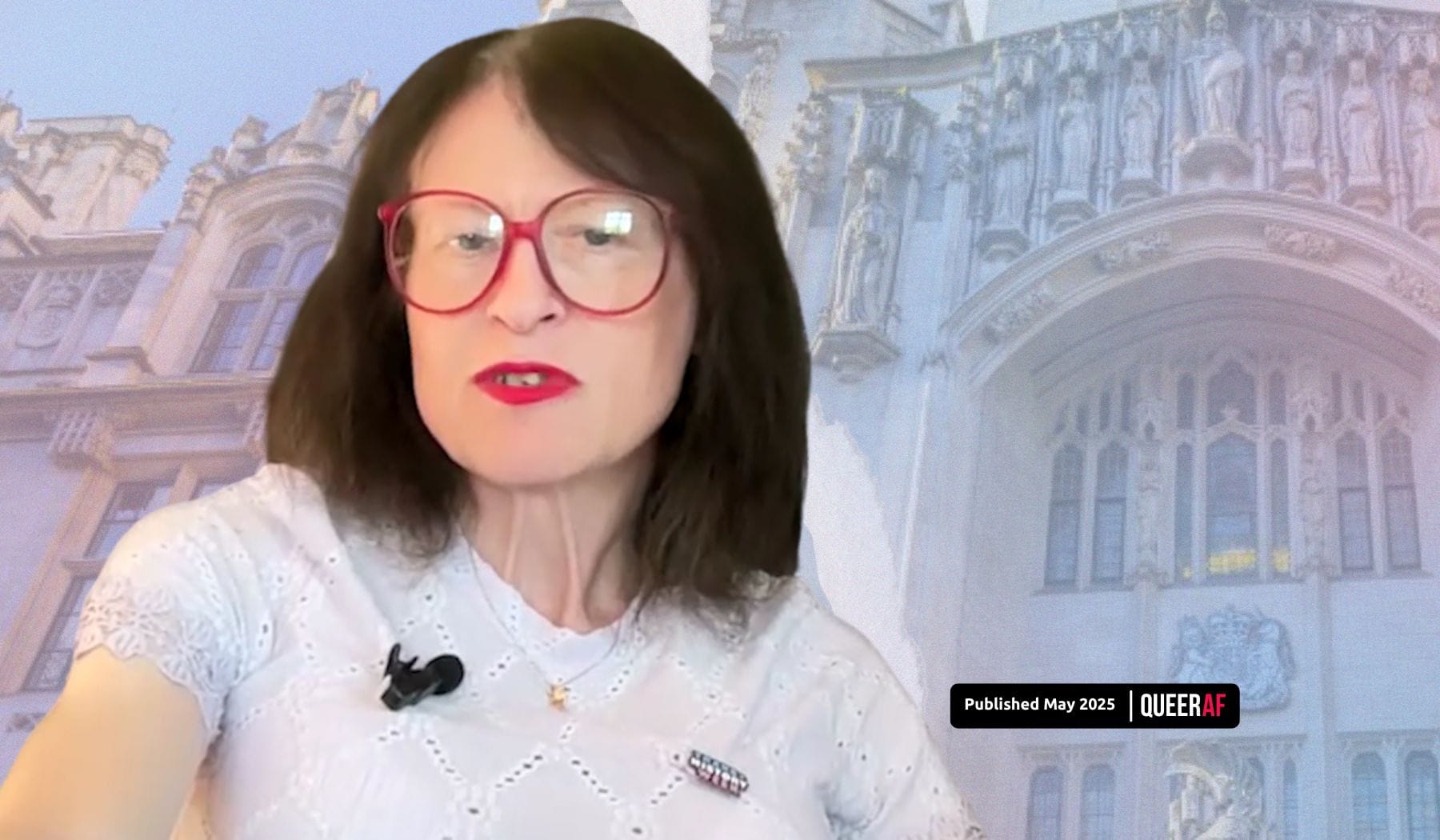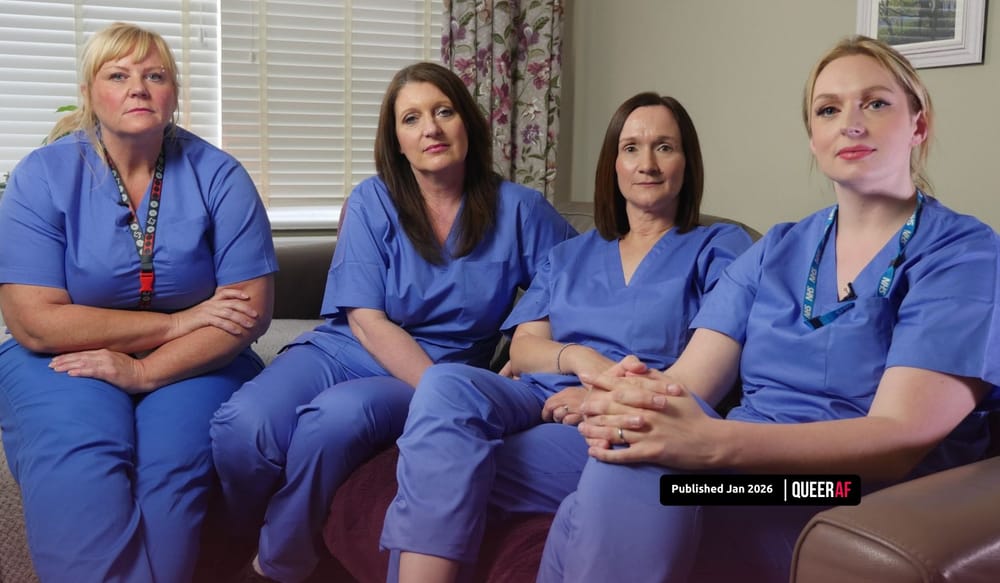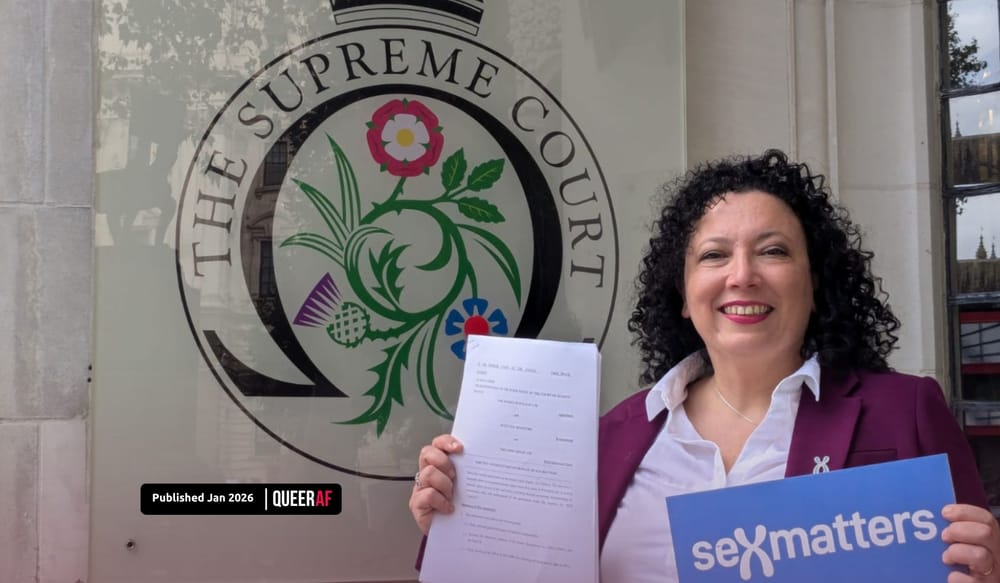TL;DR: In a video address released for Trans+ History Week shared exclusively with QueerAF, the Trans+ judge who is set to make history with plans to challenge the UK's Supreme Court ruling on the legal definition of a woman in the Equality Act 2010 at the European Court of Human Rights sets out the fight ahead, amid what she calls an "epidemic" of misogynistic violence in the UK.
The UK's only ever out transgender judge is taking the UK government to the European Court of Human Rights over the recent Supreme Court ruling that excluded trans women from the definition of a woman in the Equality Act 2010.
In a queer media exclusive, Dr Victoria McCloud, former High Court judge, told QueerAF in an address for Trans+ History Week that she is taking the UK government to the European Court of Human Rights.
In a confident tone, she says the court "is about ensuring that countries don’t abuse the reasonable freedoms of their citizens", - adding that this is a value the UK helped to shape as the court was set up in the wake of the Second World War.
"20 years ago, the UK passed the Gender Recognition Act 2004 because the UK was infringing the human rights of people who had undergone or were undergoing what we might have called at the time “a sex change”, which we now call gender reassignment. It [the European Court of Human Rights] ruled against the UK because it did not legally recognise the right to have a change of sex recognised."
McCloud's assessment of the Supreme Court ruling is that it undermines this previous ruling - and that is the basis for taking the UK back to the European Court of Human Rights.
Who is former High Court judge Victoria McCloud?
McCloud stepped back from the court last year and is now working on building a case that could overturn the Supreme Court ruling and affirm the rights of Trans+ people all over Europe. This is critical - following her announcement of the challenge, gender-critical groups have announced they will now campaign to make the impact Europe-wide.
McCloud says this challenge "engages the human rights and privacy of all EU citizens" as she calls on parliaments and data protection commissioners to sit up and pay attention. This call is echoed by Transgender Europe (TGEU), who added in a statement McCloud reads in her address that "it is time for robust anti-discrimination legislation in the UK and in Europe, that protects trans people's access to public goods and services on the basis of sex and on the basis of their gender identity."
The Supreme Court delivered its ruling without hearing from a single Trans+ person. McCloud was one of the handful of Trans+ people who wanted to present arguments to the Supreme Court about how its outcome would affect them - but was denied the opportunity.
"They refused without reasons. That, with genuine respect to them, hobbled their ability to explore the human rights implications of alternative interpretations of the Equality Act. We were not heard."
Dr McCloud now works as a litigation strategist for W-Legal, London. She believes the Supreme Court's decision could be in breach of human rights law because the UK is bound by European Court of Human Rights decisions under the 1998 Human Rights Act.
Both the Conservatives and the Reform party, who made significant gains in the local elections this week, are considering taking the UK out of this jurisdiction. For both parties, the argument is tied to 'completing Brexit'. For now, however, the European Court of Human Rights remains the final legal backstop for human rights issues that have exhausted challenges in UK courts.
Dr McCloud now has just less than four months to file an application.
McCloud: UK in an epidemic of misogynistic violence
Referencing the rise of the likes of Andrew Tate, and cases like those of Sarah Everard, McCloud tells QueerAF in her Trans+ History Week address that the United Kingdom is in the "midst of an epidemic of growing misogynistic violence towards anyone perceived as female." But instead of addressing the issue, politicians are obsessing over toilets.
She also criticised the Secretary of State for Justice for saying that it is “unacceptable” to question the judgments of the Supreme Court. "Lawyers and journalists do that all the time, as do judges sometimes. Ordinary people down the pub do so. It is our right to do so," she says in the address.
Analysis: A trans judge, who refuses to comply
Speaking to McCloud over the last week, it's clear where she draws so much of her hope and spirit from. It's from ordinary people who have been reaching out to her non-stop since she announced the plans for a challenge. It's from knowing the power of freedoms that should have been fought, won and settled behind us.
But most of all, it comes from an overwhelming sense of justice and of what is right.
"To you all, what I say with a conciliatory heart and with, I hope reasonableness, is that I hope the UK can return to the tolerant way that things worked a few years ago. I hope the real, reasonable people of the UK and its politicians will hear this. I hope the Government will hear this.
"But if matters do not return to a tolerance reflecting our national values, then the determination of the LGBTQIA+ community and now I believe the whole EU community, has an unwavering resolution that we will not let this stand and that by legal means in court, we will regain and protect our rights, freedoms and obligations.
"A trans man I will call James messaged me today. 'I am connecting with you to show support as I now live in fear of an uncertain future'
"He speaks for us all."
Watch the full address for Trans+ History Week

We face an acute period ahead of us in our community:
A time where people who hate us are feeling more and more enabled to share, spread and communicate those attitudes.
In this period of uncertainty, you can trust QueerAF to be here - in your inbox every Saturday, to ensure you have all the latest information you need to navigate the changes, and to know how to fight back.
The kind of journalism we do week in week out, goes far beyond writing the 4000 words in this newsletter every week, or spending all week newsgathering. It requires us to build relationships with queer organisations, advocacy groups and with activists to ensure our ears are on the ground, and that we can connect the dots - so you're better equipped for the fight ahead.
QueerAF is a small team; for now, I'm the only one who works here full time and on top the news I do, I work with our network of contributors, mentees on our training schemes and freelance staff - to ensure we punch above our weight. We're both small and mighty.
But I'll level with you: we need your help. QueerAF's largest source of revenue is from people like you. That's by design. We've refused ads in this newsletter because it keeps us focused on what counts, not what clicks. It helps us stay grounded with what the community needs.
If you can, please join the hundreds of other QueerAF members who ensure our small but mighty newsletter, can take on the mainstream media and deliver you the information you need for the fight ahead.










